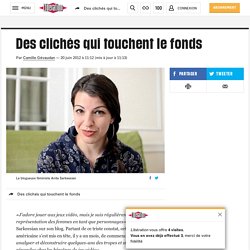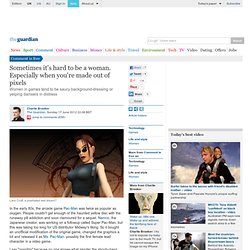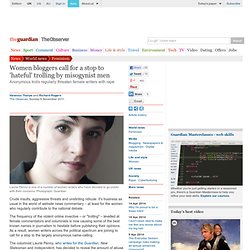

Des clichés qui touchent le fonds. «J’adore jouer aux jeux vidéo, mais je suis régulièrement déçue par la représentation des femmes en tant que personnages» , explique Anita Sarkeesian sur son blog.

Partant de ce triste constat, cette féministe américaine s’est mis en tête, il y a un mois, de commencer à «explorer, analyser et déconstruire quelques-uns des tropes et stéréotypes les plus répandus chez les héroïnes de jeu vidéo» . Elle compte présenter le résultat de son étude sous la forme d’une collection de courtes vidéos à diffuser via YouTube, sur le même modèle que la série Feminist Frequency qui l’a fait connaître sur le Web et où elle décortiquait, avec un angle plus général, les petits travers machistes dans la culture populaire. Immédiatement, son projet a trouvé un large écho en ligne, grâce au relais de nombreux sites et blogs spécialisés dans les jeux vidéo.
Paru dans Libération du 19 juin 2012 Lire les réactions à cet article. Camille Gévaudan. Sometimes it's hard to be a woman. Especially when you're made out of pixels. Lara Croft: a pixellated wet dream?

In the early 80s, the arcade game Pac-Man was twice as popular as oxygen. People couldn't get enough of the haunted yellow disc with the runaway pill addiction and soon clamoured for a sequel. Namco, the Japanese creator, was working on a followup called Super Pac-Man, but this was taking too long for US distributor Midway's liking. So it bought an unofficial modification of the original game, changed the graphics a bit and released it as Ms. Pac-Man: possibly the first female lead character in a video game. I say "possibly" because no one knows what gender the shooty-bang thing you controlled in Space Invaders was because it didn't have stubble or knockers to define itself by.
"Pac-Man was the first commercial video game to involve large numbers of women as players – it expanded our customer base and made Pac-Man a hit," claimed a Midway spokesman at the time. Thanks, men! "Fucking hypocrite slut," quipped one gallant observer. This is what online harassment looks like. An online game invites players to "beat up Anita Sarkeesian". When I first wrote about the sexist abuse of women online, collating the experiences of nearly a dozen writers, the response was largely positive. Many hadn't been aware there was a problem; they were shocked. Others had assumed that they were the only ones whose every word on the web was greeted with a torrent of abusive, threatening comments.
But a few reactions stood out, among them that of Brendan O'Neill, the Telegraph blogs section's resident contrarian. He wrote that feminist campaigners pointing this out was a "hilarious echo of the 19th-century notion that women need protecting from vulgar and foul speech". The best response to that argument, incidentally, comes from Ally Fogg, who wrote recently: What you fail to understand is that the use of hate speech, threats and bullying to terrify and intimidate people into silence or away from certain topics is a far bigger threat to free speech than any legal sanction.
Women bloggers call for a stop to 'hateful' trolling by misogynist men. Laurie Penny is one of a number of women writers who have decided to go public with their concerns.

Photograph: Guardian Crude insults, aggressive threats and unstinting ridicule: it's business as usual in the world of website news commentary – at least for the women who regularly contribute to the national debate. The frequency of the violent online invective – or "trolling" – levelled at female commentators and columnists is now causing some of the best known names in journalism to hesitate before publishing their opinions. As a result, women writers across the political spectrum are joining to call for a stop to the largely anonymous name-calling. The columnist Laurie Penny, who writes for the Guardian, New Statesman and Independent, has decided to reveal the amount of abuse she receives in an effort to persuade online discussion forums to police threatening comments more effectively. The author and feminist writer Natasha Walter has also been deterred.